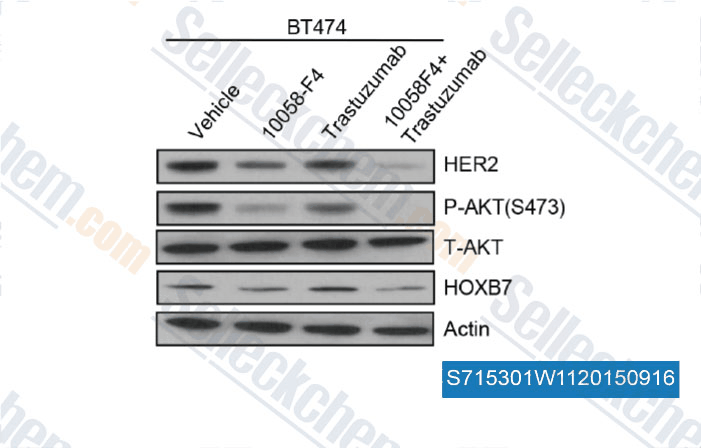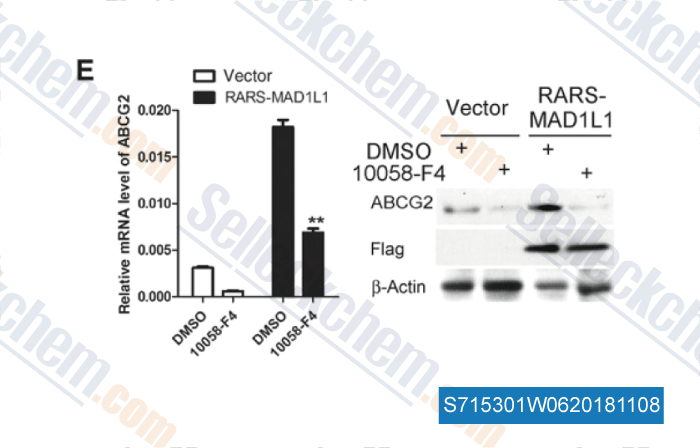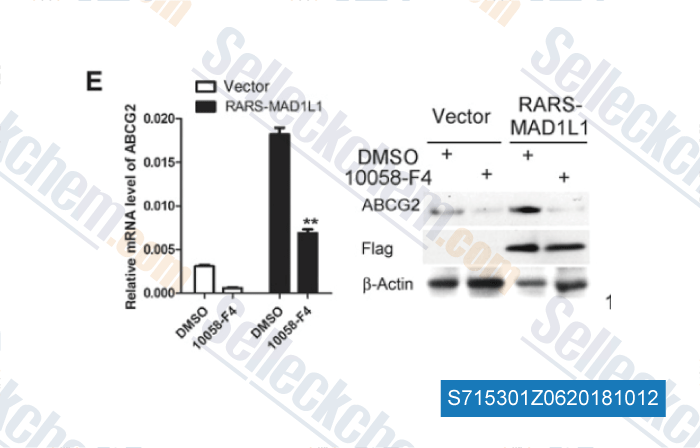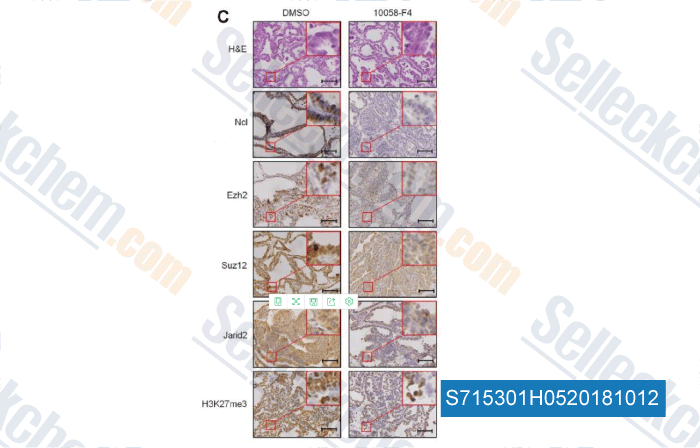|
Toll Free: (877) 796-6397 -- USA and Canada only -- |
Fax: +1-832-582-8590 Orders: +1-832-582-8158 |
Tech Support: +1-832-582-8158 Ext:3 Please provide your Order Number in the email. |
Technical Data
| Formula | C12H11NOS2 |
||||||
| Molecular Weight | 249.35 | CAS No. | 403811-55-2 | ||||
| Solubility (25°C)* | In vitro | DMSO | 50 mg/mL (200.52 mM) | ||||
| Ethanol | 13 mg/mL (52.13 mM) | ||||||
| Water | Insoluble | ||||||
| In vivo (Add solvents to the product individually and in order) |
|
||||||
|
* <1 mg/ml means slightly soluble or insoluble. * Please note that Selleck tests the solubility of all compounds in-house, and the actual solubility may differ slightly from published values. This is normal and is due to slight batch-to-batch variations. * Room temperature shipping (Stability testing shows this product can be shipped without any cooling measures.) |
|||||||
Preparing Stock Solutions
Biological Activity
| Description | 10058-F4 is a c-Myc inhibitor that specificallly inhibits the c-Myc-Max interaction and prevents transactivation of c-Myc target gene expression. 10058-F4 promotes a caspase-3-dependent apoptosis and modulates autophagy. | |
|---|---|---|
| Targets |
|
|
| In vitro | 10058-F4 inhibits growth of leukemic cells and dimerization of Myc and Max. 10058-F4 induces cell-cycle arrest and apoptosis of AML cells. 10058-F4 arrests AML cells at G0/G1 phase, downregulates c-Myc expression and upregulated CDK inhibitors, p21 and p27. Meanwhile, 10058-F4 induces apoptosis through activation of mitochondrial pathway shown by downregulation of Bcl-2, upregulation of Bax, release of cytoplasmic cytochrome C, and cleavage of caspase 3, 7, and 9. Furthermore, 10058-F4 also induces myeloid differentiation, possibly through activation of multiple transcription factors. Similarly, 10058-F4-induced apoptosis and differentiation could also be observed in primary AML cells. [1] 10058-F4 decreases c-Myc protein levels, inhibites proliferation of HepG2 cells likely through upregulation of cyclin-dependent kinase (cdk) inhibitor, p21WAF1 and lowers intracellular levels of [alpha]-fetoprotein (AFP). Treatment with 10058-F4 also downregulates human telomerase reverse transcriptase (hTERT) at the transcriptional level. In addition to inhibiting the proliferation of HepG2 cells, 10058-F4 enhances sensitivity to conventional chemotherapeutic agents. [2] |
|
| In vivo | Peak plasma 10058-F4 concentrations of approximately 300 μM are seen at 5 min and declined to below the detection limit at 360 min following a single iv dose. Plasma concentration versus time data are best approximated by a two-compartment, open, linear model. The highest tissue concentrations of 10058-F4 are found in fat, lung, liver, and kidney. Peak tumor concentrations of 10058-F4 are at least tenfold lower than peak plasma concentrations. Eight metabolites of 10058-F4 are identified in plasma, liver, and kidney. The terminal half-life of 10058-F4 is approximately 1 h, and the volume of distribution is >200 ml/kg. No significant inhibition of tumor growth is seen after i.v. treatment of mice with either 20 or 30 mg/kg 10058-F4.[3] |
Protocol (from reference)
| Cell Assay: |
|
|---|---|
| Animal Study: |
|
References
|
Customer Product Validation

-
Data from [Data independently produced by , , Cancer Discov, 2015, 5(9): 944-59]

-
Data from [Data independently produced by , , Clin Cancer Res, 2018, 24(3):659-673]

-
Data from [Data independently produced by , , Clin Cancer Res, 2018, 24(3):659-673]

-
Data from [Data independently produced by , , Theranostics, 2017, 7(7):2092-2107]
Selleck's 10058-F4 has been cited by 112 publications
| STAT1 regulates immune-mediated intestinal stem cell proliferation and epithelial regeneration [ Nat Commun, 2025, 16(1):138] | PubMed: 39746933 |
| The balance between IFN-γ and ERK/MAPK signaling activities ensures lifelong maintenance of intestinal stem cells [ Cell Rep, 2025, S2211-1247(25)00057-9] | PubMed: 39952238 |
| β-Catenin/c-Myc Axis Modulates Autophagy Response to Different Ammonia Concentrations [ Adv Biol (Weinh), 2025, e2400408.] | PubMed: 39798123 |
| Adipocyte-derived ferroptotic signaling mitigates obesity [ Cell Metab, 2024, S1550-4131(24)00456-X] | PubMed: 39729998 |
| Integrative clinical and preclinical studies identify FerroTerminator1 as a potent therapeutic drug for MASH [ Cell Metab, 2024, S1550-4131(24)00284-5] | PubMed: 39142286 |
| An iron rheostat controls hematopoietic stem cell fate [ Cell Stem Cell, 2024, S1934-5909(24)00041-9] | PubMed: 38402617 |
| Low PPP2R2A expression promotes sensitivity to CHK1 inhibition in high-grade serous ovarian cancer [ Theranostics, 2024, 14(19):7450-7469] | PubMed: 39659585 |
| Salmonella cancer therapy metabolically disrupts tumours at the collateral cost of T cell immunity [ EMBO Mol Med, 2024, 16(12):3057-3088] | PubMed: 39558103 |
| VAV2 orchestrates the interplay between regenerative proliferation and ribogenesis in both keratinocytes and oral squamous cell carcinoma [ Sci Rep, 2024, 14(1):4060] | PubMed: 38374399 |
| Morroniside promotes skin wound re-epithelialization by facilitating epidermal stem cell proliferation through GLP-1R-mediated upregulation of β-catenin expression [ Acta Biochim Biophys Sin (Shanghai), 2024, 56(7):1072-1084] | PubMed: 38779766 |
RETURN POLICY
Selleck Chemical’s Unconditional Return Policy ensures a smooth online shopping experience for our customers. If you are in any way unsatisfied with your purchase, you may return any item(s) within 7 days of receiving it. In the event of product quality issues, either protocol related or product related problems, you may return any item(s) within 365 days from the original purchase date. Please follow the instructions below when returning products.
SHIPPING AND STORAGE
Selleck products are transported at room temperature. If you receive the product at room temperature, please rest assured, the Selleck Quality Inspection Department has conducted experiments to verify that the normal temperature placement of one month will not affect the biological activity of powder products. After collecting, please store the product according to the requirements described in the datasheet. Most Selleck products are stable under the recommended conditions.
NOT FOR HUMAN, VETERINARY DIAGNOSTIC OR THERAPEUTIC USE.
